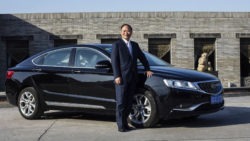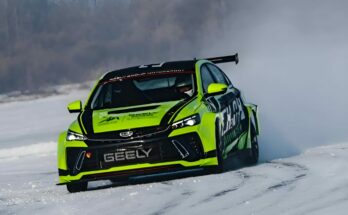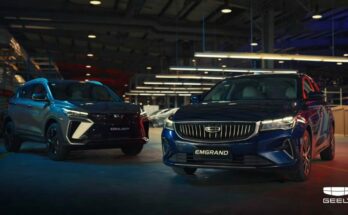Geely’s Lynk & Co brand launched their second vehicle, the 02 crossover SUV last month. The Lynk & Co brand is positioned between Volvo and Geely and its primary aim is to manufacture and sell cars in Europe and USA, while meeting the European & American quality and safety standards.
Related: Geely’s Lynk & Co 02 Launched
So far the brand has launched the 01 SUV and 02 crossover and is soon to launch the 03 sedan as well. Reportedly their first model targeting the European market, will be put into production at Volvo’s Ghent Plant in Belgium in 2019 and will go on sale in the European markets in the first half of 2020.


It will be the first time, a Chinese-branded car will be made in Western Europe for sale there, with the ultimate goal of landing the showrooms of USA. That’s the master plan of billionaire Li Shufu, who has catapulted from founding Geely Group as a refrigerator maker in the 1980s to owning Volvo Cars, British sports carmaker Lotus, London Black Cabs, Acquiring Malaysian carmaker Proton and becoming the largest single shareholder in Daimler AG—the inventor of the automobiles.
Related: Geely Founder Li Shufu Acquires 9.69% of Daimler AG Becoming Largest Single Shareholder
Li Shufu is spearheading China’s aspirations to wedge itself among the big three of the global car industry—the U.S., Germany and Japan—so they become the Big Four. Li, while talking to Bloomberg News said:
“I want the whole world to hear the cacophony generated by Geely and other made-in-China cars. Geely’s dream is to become a globalized company. To do that, we must get out of the country (China).”
Related: BYD Tang- The 7-seat SUV that will do 0-100 in 4.5 Seconds!

At least four Chinese carmakers including GAC, and three Chinese-owned startups—SF Motors Inc., NIO and Byton—plan to sell cars in the USA starting next year. At the same time, Warren Buffett-backed BYD Co. is building electric buses in California; Baidu Inc. is partnering with Microsoft Corp., TomTom NV and Nvidia Corp. on a self-driving platform; and Beijing-based TuSimple Inc. is testing autonomous-driving big rigs in Arizona.
Related: BYD Steals the Spotlight at 2018 Beijing Auto Show
The industry is set for more commotion as China unravels a two-decade policy that capped a 50% foreign ownership of carmaking ventures. The change will energize companies such as Volkswagen AG and Ford Motor Co. to seek a bigger piece of the world’s largest car market (China) and allow Tesla Inc. to set up a fully owned unit. Carmakers may get better visibility of their futures, and those Chinese companies that fear losing sales at home may sense a greater thrust to go abroad.

Related: GAC Launches the Trumpchi GA4
Anna-Marie Baisden, head of autos research in London with BMI Research, said about Chinese carmakers:
“They are in a better position now than they ever have been. They’ve had so much time working with international manufacturers and have become a lot more mature.”
Related: 5 Stunning Facts About The Chinese Car Market
A few decades ago, South Korea’s Hyundai Motor Group was mocked for fragile engines and rust-sensitive body panels. Now it’s one of the five biggest manufacturers in the world, selling about 1.25 million cars in the U.S. last year, according to Bloomberg Intelligence. The group also has factories in Alabama and Georgia.

Matthias Mueller, former chief executive officer of Volkswagen, Europe’s biggest carmaker said:
“Competitors emerging from China must be taken seriously. I visited China for the first time in 1989, and the development that has happened there since then is just impressive.”
The Chinese are getting under the hoods of foreign brands by buying up parts suppliers, making batteries for the world’s EV fleet and corralling supplies of the metals that give those batteries life. Automakers such as Geely, Chery and BYD started talking a decade ago about cracking the U.S. auto market with an array of low-cost passenger vehicles. Those efforts stalled, so the industry built a global presence through acquisitions.
Related: Geely Design Chief Peter Horbury Talks About Creating an Image for the Rising Brand
Chinese companies have announced at least $31 billion in overseas deals during the past five years, buying stakes in carmakers and parts producers, according to data compiled by Bloomberg.

The most prolific buyer is Li Shufu, who spent almost $13 billion on stakes in Daimler and truckmaker Volvo. Tencent Holdings Ltd., Asia’s biggest internet company, and paid about $1.8 billion for 5% of Tesla.
Related: Why Chinese Cars Should Worry European Automakers- Luca Ciferri
As software and electronics become just as critical to a car as the engine, China is ensuring it doesn’t lag behind in that market, either. Baidu, owner of the nation’s biggest search engine, announced a $1.5 billion Apollo Fund to invest in 100 autonomous-driving projects during the next three years.
Then there’s Contemporary Amperex Technology Ltd. (CATL), the maker of electric-vehicle batteries that’s planning a $1.3 billion factory with enough capacity to surpass the output of Tesla and dwarf the suppliers for GM, Nissan and Audi.

The company plans to raise 13.1 billion yuan as soon as this year by selling a 10% stake, at a valuation of about $20 billion. The bulk of the new funds would pay for a manufacturing plant that would make CATL the world’s biggest maker of lithium-ion batteries.
Related: Changan Officially Unveils the Magnificent Raeton CC
CATL already supplies Volkswagen and owns 22% of Finland’s Valmet Automotive Oy, a contract manufacturer for Daimler’s Mercedes-Benz.

To juice those EV batteries, Chinese companies are also leading the way in securing necessary raw materials like cobalt and lithium. Chinese companies make about 60 % of the world’s refined cobalt, according to trading firm Darton Commodities Ltd.
Related: The 2018 Changan Eado and Eado XT
China Molybdenum Co. is the world’s second-biggest cobalt miner after Glencore Plc. The company, with a market value of more than $24 billion, became a major force in battery metal in 2016 after buying control of the cobalt-rich Tenke Fungurume mine in the Democratic Republic of Congo.

The Chinese government sees electric vehicles (EVs) as its best chance to seize global leadership in an emerging powertrain technology. Cleaning the smoggy environment and reducing a dependency on foreign petroleum are bonuses.
Related: NIO Officially Launches the ES8 7-seat Electric SUV
China, already the world’s biggest vehicle market, overtook USA as No.1 for EVs in 2015. This year’s Beijing Auto Show featured 174 EV models, with 124 of them developed domestically. China’s knack for speedy adaptation has put the country in a position to lead the auto industry in new technologies, Toyota China’s Chief Executive Officer Kazuhiro Kobayashi said.
Chinese President Xi Jinping showed his determination to rewrite the rules of the automotive industry in 2014, he said:
Developing new-energy vehicles is the only way for China to move from a big automobile country to a powerful automobile hub.
from Bloomberg

A computer animation professional with over 23 years of industry experience having served in leading organizations, TV channels & production facilities in Pakistan. An avid car enthusiast and petrolhead with an affection to deliver quality content to help shape opinions. Formerly written for PakWheels as well as major publications including Dawn. Founder of CarSpiritPK.com





